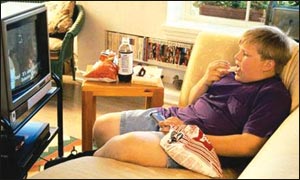Lifestyle change the way to beat US obesity: experts
Childhood obesity is now the United States' worst health crisis,
experts said, urging parents to ban television in kids' rooms and
lawmakers to slap a tax on sugar-laden sodas.
Two-thirds of US adults and around one fifth of American children are
now overweight or obese, and the rising rate of obesity in the United
States has had a debilitating effect on Americans' health and US health
care spending.
 |
 |
| Obesity-File
photo shows overweight children working out at a Fitness Center
in Upper Marlboro, Maryland. Childhood obesity is now the United
States’ worst health crisis, experts said, urging parents to ban
television in kids’ rooms and lawmakers to slap a tax on
sugar-laden sodas. |
CDC officials
outlined two dozen steps, ranging from banning televisions from
children’s bedrooms |
In addition to costing the United States of billions of dollars every
year, the obesity epidemic means a generation of Americans could have
shorter lives than their parents.
"Childhood obesity is the number one public health problem in the
country, putting the younger generation at risk of being the first in
the history of our country to have a shorter lifespan than their
parents", former president Bill Clinton told the "Weight of the Nation"
conference.
The conference was the first gathering on obesity organized by the
Centers for Disease Control and Prevention (CDC). Clinton was
representing the Alliance for a Healthier Generation, which aims to
significantly cut childhood obesity by 2015.
CDC officials outlined two dozen steps, ranging from banning
televisions from children's bedrooms to making it easier for people to
buy fresh food, that would help lower obesity rates and related medical
costs, which have nearly doubled since 1998.
Eleven years ago, the medical costs associated with obesity were
around 78 billion dollars a year, in 2006, they had climbed to around
147 billion dollars annually, according to a study released to coincide
with Monday's conference.
A normal-weight person's annual health care expenditures are around
41 percent lower than those of obese individuals, said Dr Eric
Finkelstein, lead author of the study.
The bulk of obesity-related medical spending is not linked to
clinical procedures such as bariatric surgery, but rather to treating
diseases caused by obesity, such as diabetes. "The lion's share of
diabetes in the US is caused by excess weight", said Dr Thomas Frieden,
head of the CDC.
The overall cost of treating diabetes is 191 billion dollars a year,
according to the study led by Finkelstein. "Obesity is costly, the only
way to show real savings in health expenditures in the future is through
efforts to reduce obesity and related health conditions", Finkelstein
said.
The way to do that, according to Clinton, Frieden and William Dietz,
director of the CDC's division of nutrition and physical activity, is to
get Americans to change the way they live.
"Obesity is a public health issue that cannot be dealt with entirely
in the confines of a medical office," Clinton told the conference. "We
have to change what goes on in our homes, in our communities, in our
schools," he said.
The average American is now 23 pounds (11 kilos) overweight, and
nearly half of the extra 350 calories a day that Americans consume that
they did not several decades ago come from sodas.
Those figures have prompted Frieden, who used hefty taxes on tobacco
products to spearhead a successful campaign to curb smoking in New York,
to suggest a similar tax on sugary soft drinks to help fight obesity.
Dietz told a group of schoolchildren from Pennsylvania that 65
percent of US children have a television in their bedroom, adding that
he thought the box should be banned from kids' rooms, and youngsters
encouraged to be physically active instead.
Obesity is defined as having a body mass index, calculated by
dividing a person's weight in kilograms by their height squared in
meters, greater than 30. In health terms, it means a person is at
greater risk for a whole host of maladies, ranging from high blood
pressure to diabetes, heart disease and stroke.
According to a report issued earlier this month, obesity could
account for one in six dollars spent on health care by 2030. Monday's
conference coincided with a vigorous debate among US lawmakers over
President Barack Obama's plans to reform health care.
"Obesity has become a microcosm of the whole thing we need to be
thinking about with health care reform," Clinton said. The people most
likely to be obese are America's poor, said Frieden; "the non-rich who
can just barely pay their bills," said Clinton.
Many live in unsafe urban areas where children can't play outside.
They have limited access to fresh, healthy food and even less time to
prepare it because they work so hard to make ends meet.
So they instead buy "high-bulk, low nutrition food" and keep their
children indoors, unwittingly perpetuating America's cycle of obesity.
Karin Zeitvogel Karin Zeitvogel |



